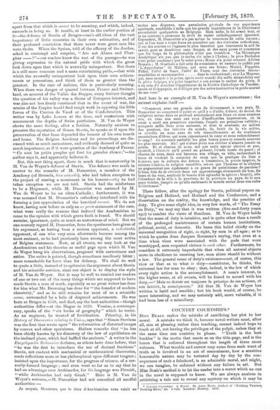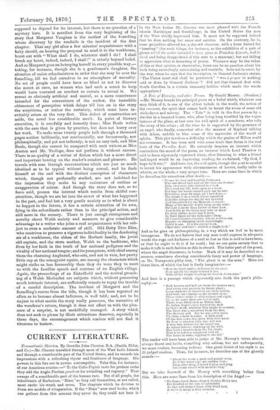COUNTRY COURTSHIPS.* Miss BEALE makes the mistake of sacrificing her
plot to her moral. A mistake we think it, because novel-writers must, after all, aim at pleasing rather than teaching, cannot indeed hope to teach at all, not having the privileges of the pulpit, unless they at the same time can contrive to please. " Truth is the best buckler" is the motto that meets us on the title-page, and is the lesson that is enforced throughout the length of three stout volumes. What trouble and sorrow may come from such want of truth as is involved in an act of concealment, how a sensitive honourable nature may be tortured day by day by the con- sequences of such a falsehood, is an admirable moral, and might, we can imagine, be enforced without any failure in art. But Mies Scale's method is to let the reader into a secret which no one in the novel is supposed to know. We are always anxious in criticizing a tale not to reveal any mystery on which it may be
• Country Courtships. A Novel. By Anne Beale. Author of "Nothing Venture, Nothing Have," Sc. 3 vols. London: Bentley. 1869. supposed to depend for its interest, but there is no question of a mystery here. It is manifest from the very beginning of the story that Margaret Vaughan is the mother of the foundling whose discovery by the roadside is the incident of the first chapter. That any girl after a few minutes' acquaintance with a baby should, on hearing the proposal to send it to the workhouse, burst out with " What shall I do, whatever shall I do ? I shall break my heart, indeed, indeed, I shall !" is utterly beyond belief. And so Margaret goes on betraying herself in every possible way,— taking, for instance, though she is a gentleman's daughter, the situation of union schoolmistress in order that she may be near the foundling, till we feel ourselves in an atmosphere of unreality. No set of people could have been so blind as not to discover the secret at once, no woman who had such a secret to keep would have ventured on conduct so certain to reveal it. We resent as obviously artificial and unreal, as a mere contrivance intended for the convenience of the author, the incredible obtuseness of perception which delays till late on in the story the suspicions, or rather the certainty, which must have in- evitably arisen at the very first. This defect of construction set aside, the novel has considerable merit. In point of literary .execution, it is carefully and honestly done ; Miss Beale writes with the ease that is given by practice, but does not hurry over ber work. To make some twenty people talk through a thousand gages neither brilliantly, nor sentimentally, nor humorously, nor ,philosophically, and yet not tediously, is not an easy task, and Miss Beale, though she cannot be compared with such writers as Miss Austen and Mr. Trollope, does not perform it without success. -There is no quality of a writer of fiction which has a more direct and important bearing on the reader's comfort and pleasure. He travels with ease through conversations which are just so much idealized as to be typical without being unreal, and he finds himself at the end with the distinct conception of characters which, though not profoundly studied, are not indebted for the impression they make to any caricature of outline or exaggeration of colour. And though the story does not, as we have said, possess the interest which results from skilful con- struction, though we are let into the secret of what has happened in the past, and feel but a very gentle anxiety as to what is about to happen in the future, it has a certain attraction of its own, lying in the subordinate rather than in the principal action, and still more in the scenery. There is just enough strangeness and novelty about Welsh society and manners to give considerable advantage to a writer who joins a real acquaintance with her sub- ject to even a moderate amount of skill. Old Betty True Blue, who contrives to preserve a vigorous individuality in the deadening air of a workhouse, the elders of the Herbert family, the jovial old captain, and the stern mother, Welsh to the backbone, who lives by her faith in the truth of her national pedigrees and the 'vitality of her national tongue; and its youngsters, with chief among them the charming Angharad, who sets, and not in vain, her pretty little cap at the misogynist squire, are among the characters which might strike us less favourably than they do were they to meet us with the familiar speech and costume of an English village. Again, the proceedings of an Eistcdfodd and the revival preach- ing of a Welsh Methodist are subjects which, without possessing much intrinsic interest, are sufficiently remote to repay the trouble • of a careful description. The incident of Margaret and the foundling's rescue from the tide, though it has been repeated so often as to become almost ludicrous, is well told; and, not to be unjust to what merits the story really possesses, the narrative of the wanderer's return, though it does not affect us with the plea- sure of a surprise, is not unskilfully managed. A story which does not seek to please by illicit attractions deserves, especially in these days, the encouragement which readers will not find it tiresome to bestow.



































 Previous page
Previous page